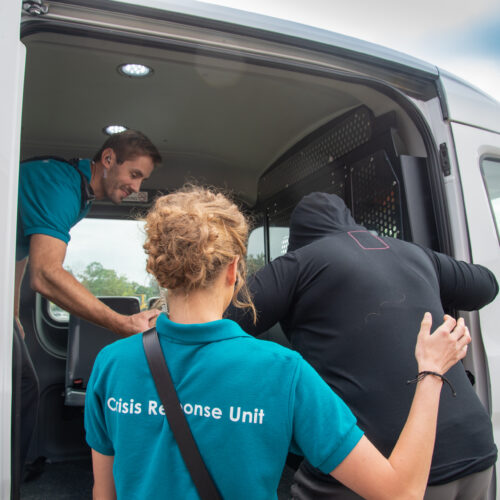Apply Now to Make Your Community Safety Program More Gender-Responsive
The Council of State Governments (CSG) Justice Center, in collaboration with the Center for Policing Equity (CPE), is hosting a virtual learning community focused on infusing gender-responsive principles into community-based crisis response and violence intervention programs.
The learning community will be led by the CSG Justice Center, a national nonprofit that provides data-driven solutions for complex justice challenges, and CPE, a leader in public safety redesign. It will include opportunities for mutual learning through peer-to-peer support and guidance from leading experts in the field.
Throughout the learning community, participants will explore strategies for building effective partnerships and learn why it is essential for community-based response teams to integrate gender-responsive principles into their practices when working with girls, cisgender women, transgender women, and non-binary people. Law enforcement-led crisis models often fail to meet the unique needs of escalating situations rooted in unaddressed trauma and unmet social or behavioral health needs. Community-based crisis response and violence intervention programs are well-positioned to prevent unnecessary criminal justice system contact and support system navigation for these populations.
Teams will complete a needs assessment and work with CSG Justice Center and CPE staff to better understand the needs of girls, cisgender women, transgender women, and non-binary people who are at risk of criminal justice involvement in their community. Sessions will cover key topics such as women’s pathways to justice involvement, trauma-informed approaches, and cultivating essential partnerships.
For the purposes of this application, community-based crisis response and violence intervention programs include the following:
- Community responder programs that offer an additional option for first response. Composed of multidisciplinary professionals trained to address behavioral health and quality-of-life concerns, community responder programs provide a person-centered response to 911 and other emergency calls for service. Integrating community responder programs into first response systems ensures that all calls for service can receive the most appropriate response.
- Community violence intervention and prevention initiatives (CVIPI) that use a public health approach to prevent and reduce violence by addressing its root causes and promoting long-term safety. These programs engage people at the highest risk of involvement in violence through strategies such as street outreach, hospital-based intervention, and intensive case management. Led by credible messengers with deep community ties, CVIPI is grounded in evidence-based and trauma-informed practices that provide mentorship, mediation, behavioral health supports, and connections to essential services.
Sessions will occur on Zoom 2:00-3:30 p.m. ET on the following dates:
- January 15, 2026
- February 19, 2026
- March 19, 2026
- April 16, 2026
- May 21, 2026
APPLY NOW.
When is the deadline?
Interested teams should submit the above application—which takes approximately 10 minutes to complete—by 11:59 p.m. ET on November 10, 2025. A CSG Justice Center staff member will follow up with applicants by Tuesday, November 18, 2025.
If you have any questions, contact Felicia Lopez Wright at fwright@csg.org.
Who should apply?
This learning community is open to all teams in the planning or early implementation phase of developing a community responder program or community violence intervention and prevention initiative that are also focused on implementing or improving their gender-responsive efforts with women, girls, and gender-diverse people.
- Planning phase: A program in its PLANNING phase has decided that a gender-responsive approach to their community violence intervention or community responder program is appropriate to meet its needs and is taking steps to eventually implement it. It should also have a designated “point person” whose job consists of relaying the information learned during community listening sessions into clear and identifiable goals for the program.
- Implementation phase: A program in its IMPLEMENTATION phase has secured funding for its community violence intervention or community responder program and has started the initial implementation and rollout of their gender-responsive approaches (this can also include participating in trainings and training stakeholders). It should also have a designated program manager working with community partners and stakeholders to improve gender-responsive programs and initiatives.
Applicants must have a shared team vision to use community-based approaches for addressing community members in crisis (or at risk of crisis) and for using a public health approach to interrupt cycles of harm without relying on law enforcement intervention.
Who should participate?
Applicants must have a dedicated project or program manager to attend each session. Depending on the session topics, the project or program manager can include additional representatives to attend, such as
- A behavioral health or public health representative;
- A representative from community-based programs, such as community responder programs, CVIPIs, women’s health services, children and family services, recovery and reentry services, peer supports, or shelter/ housing;
- LGBTQ+ advocacy or health organizations;
- A community member or family member who has experienced, or been impacted by, the criminal justice system and could have benefitted from a gender-responsive intervention; or
- A local city or county staff person or elected official.
ABOUT THE AUTHOR

This May, the state of Washington passed legislation supporting the expansion of alternative response teams (sometimes called community…
Read More Developing a Common Definition for Community Responder Programs
Developing a Common Definition for Community Responder Programs
This May, the state of Washington passed legislation supporting the expansion of alternative response teams (sometimes called community responders) as a public safety service.
Read More












